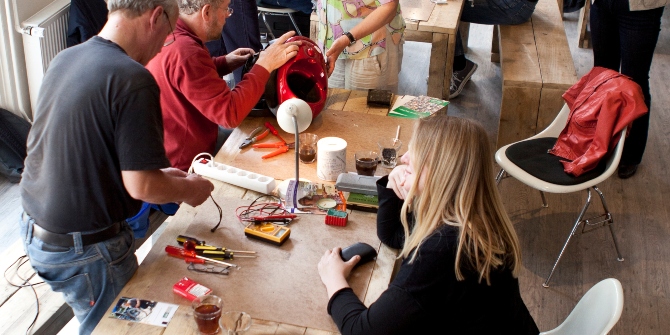
Journalists, writers and scholars alike all highlight the necessity of virtues in business, though of course with different emphases. While journalists and writers may be more interested in drawing those business virtues from popular, successful and pragmatic business people, scholars tend to recite classics of virtue ethics, like Aristotle, Adam Smith, Thomas Aquinas or Catholic social teaching amongst others. However, most of these inspirations for virtues are drawn from important figures associated with a Western mindset.
Although virtue ethics in general presents a holistic approach since it is concerned with education, character, life style and the bigger picture of society etc., Western approaches still lack the dimension of holism present in Chinese thought. The latter, especially Daoism, succeeds in including a relational worldview of nature, cosmos and the human being. Instead of being merely anthropocentric, this philosophy presents an anthropocosmic Weltanschauung, in which the human being is not at the centre, but nature. Hence, since Daoism is based on natural philosophy, the question is, what values and virtues could it offer us in addition to a Western approach to promote individual but also organisational flourishing?
“It is characteristic of the Western mind that it has no concept for Tao.” (C.G. Jung 1962)
Daoism (also Taoism) is an ancient Chinese philosophy, which emerged between 6th and 3rdBC and is often associated with the philosophers Laozi (also Lao Tzu) and Zhuangzi (also Chuang Tzu). Yet, a clear definition of Daoism is difficult. It overlaps with other prevailing philosophies of those times, like Confucianism and Buddhism, and was further influenced by the religion of the Shang (1600 to 1028 BC), as well as the Yin–Yang cosmology developed by the Han (1028 to 221 BC).
Daoism is fascinating, because it provides reasons for being virtuous from a completely new angle. Additionally, it presents us with virtues that are quite relevant and inspiring today: the philosophy of the dao 道, the “way”, implying the natural way of things. It is based on two fundamental notions: a dualism based on the two complementary forces of yin 阴 and yang 阳, which are in constant flux, and the idea of a cyclically and relationally organised world, which does not know any telos (‘final purpose’).
Dao cannot be changed nor conquered by human wisdom. Hence, since we cannot conquer dao, we are advised to model our behaviour in line with this natural way – being virtuous in a Daoist sense. Yet, the virtues to be followed were not explicitly proposed in order to create a better society like for example in Confucianism. Instead Daoist virtues are concerned with bringing the individual back to ‘nature’, to our natural course, so to speak.
Daoism is a philosophy concentrating on the good human life, which in that sense is a long life. But, for a long life we must maintain physical and mental health, which implies that we should not waste our energy. A harmonious and peaceful state of mind is therefore crucial for mental health, while moderate consumption of food and regular exercise is important to maintain physical strength. Only by being in a good state ourselves, we can also take care of others. Accordingly, Daoism conveys a very important message: Take care of yourself and then you are capable – physically and mentally – of taking care of others.
This idea of saving our energy requires self-cultivation in various ways and a profound understanding of the underlying notions in Daoism. First, we need to curb our appetite (body) and desires (mind), and focus on what is really essential to our life. Here, a generally modest attitude is key. Also, meditation is crucial to calm the mind, to make us able to focus and to eliminate negative thoughts and emotions, which eventually just lower our energy level.
Second, with this long-term perspective in mind we need to be serious about what we are doing and the potential consequences thereof. Understanding the impact of reversion and circularity on our life is vital here: things and situations are only temporary since our environment is in constant change and whatever is there can turn into its opposite. Consequentially, realising that our level of energy is essential to lead a good life makes us try to maintain it through self-cultivation. This in turn leads to a more peaceful and harmonious life, where we can take care of others by being kind, generous and supportive.
Now, how can Daoist self-cultivation make a difference in business?
Here are four suggestions regarding how Daoism can improve not only our personal well being but also positively influence our working environment:
1. More balance – better focus
Physical as well as mental self-cultivation potentially yields more effectiveness. We are more balanced, less anxious, angry or concerned, which makes it easier to stay focused and productive. Realising that circumstances are only temporary gives us a different outlook and perception. Instead of being too concerned about present circumstances and getting lost in too many details, we can better concentrate on essential things, the bigger picture.
2. More awareness – better self-organisation
Understanding the ‘logic’ of reversion and circularity makes us more aware of the consequences and interrelatedness of our actions and fosters a more serious attitude. This increased awareness promotes a better self-organisation and makes us realise the importance and relevance of even small tasks, since everything is interrelated.
3. More kindness – better cooperation
A cooperative and supportive attitude, like being kind and more caring towards our colleagues helps to promote their success too, creates a better working atmosphere and hence increases overall well-being.
4. More modesty – less egoism
Certain modesty prevents us from putting ourselves first or boasting too much with our achievements. It further prevents us from egoistically pursuing our own interests and yields less unethical behaviour, since we are no longer too concerned about potential financial and material gains.
In brief, individual self-cultivation leads to a more positive, healthier corporate culture and hence a better working environment for all within a company through an attitude of mutual support and kindness. A better working environment in turn leads to a higher level of productiveness and effectiveness through increased identification with our job role as well as loyalty towards our employer.
Besides promoting individual and organisational flourishing, Daoist virtues can be also used to develop more holistic and sustainable business models and a progressive and more inspiring way of leadership.
Disclaimer: This article is based on an analysis of the Dao De Jing by Laozi. Other Daoist works may provide a different view.
♣♣♣
Notes:
- This blog post is based on the author’s paper Daoism in Management, in Philosophy of Management, pp-1-22 (2016), doi:10.1007/s40926-015-0024-4
- The post gives the views of its author, not the position of LSE Business Review or the London School of Economics.
- Featured image credit: Yin-Yang, by 29450, under a CC0 licence
- Before commenting, please read our Comment Policy.
 Alicia Hennig is an Assistant Professor for Business Ethics at the Harbin Institute of Technology in Shenzhen, China. Her research concentrates on Chinese philosophy in business and management with a specific focus on Daoism. Furthermore, she is interested in ethical issues in the financial sector. Alicia completed her PhD in applied philosophy and ethics in April 2015 at Technical University Darmstadt in Germany. Her thesis focused on responsible business in the context of law, economics and global politics and was co-supervised by Thomas Pogge (Yale University, CT, US). The thesis also included detailed case studies on global corporations. During her PhD she gained professional industry experience by working as a freelancer for Deutsche Bank’s Group Sustainability department. In addition she was employed as a research assistant for the East-West Centre for Business Studies and Cultural Science (ECBC) at the Frankfurt School of Finance and Management in Frankfurt, a private business school in Germany. Besides, she has practical working experience at both Chinese as well as foreign companies in China.
Alicia Hennig is an Assistant Professor for Business Ethics at the Harbin Institute of Technology in Shenzhen, China. Her research concentrates on Chinese philosophy in business and management with a specific focus on Daoism. Furthermore, she is interested in ethical issues in the financial sector. Alicia completed her PhD in applied philosophy and ethics in April 2015 at Technical University Darmstadt in Germany. Her thesis focused on responsible business in the context of law, economics and global politics and was co-supervised by Thomas Pogge (Yale University, CT, US). The thesis also included detailed case studies on global corporations. During her PhD she gained professional industry experience by working as a freelancer for Deutsche Bank’s Group Sustainability department. In addition she was employed as a research assistant for the East-West Centre for Business Studies and Cultural Science (ECBC) at the Frankfurt School of Finance and Management in Frankfurt, a private business school in Germany. Besides, she has practical working experience at both Chinese as well as foreign companies in China.






The article seems to be inspired by the point of view of self cultivation lineages like Quanzhen (no self cultivation is mentioned in the Dao De Jing) however it lacks the essential which is spiritual elevation. The core of Daoist thinking is that by connecting with the transcendent Dao, one’s thinking, behavior, … will become virtuous. If one just want to be calm and focus, no need for Daoist practice, relaxation will be sufficient.
You are absolutely right, Jean-Yves.
However, I left it out for ‘pragmatic’ reasons so to say and to make this whole idea more accessible to people who are not looking for those higher aims like spirituality but just for inspiration for general improvement.
Very interesting article, well done Alicia!
Just to add that in Chapter 54 of Dao De Jing, it did mention self cultivation as one of the key arguments. It might be the translations, from what I’m reading in Chinese, self cultivation certainly is the basis for one’s virtue, family, community and eventually, one’s country.
I agree with Wenjin about the concept of self-cultivation from the Confucian tradition as the basis for one’s virtue, family, community and eventually, one’s country. I think this model from Confucius followed for the next two millennia by scholar-bureaucrats is very conducive to business and the workplace.
Totally agree with both of you, Wenjin and Terri. Next time I should go more into the virtue ethics perspective I think. I am still a huge fan on virtue ethics. I personally find it much more pragmatic than rule-based ethics.